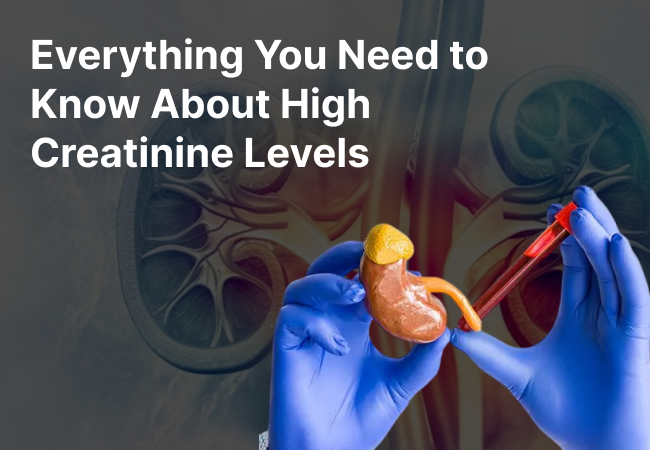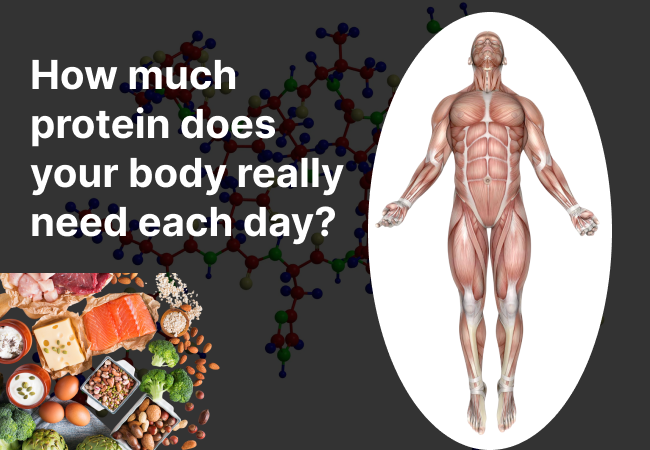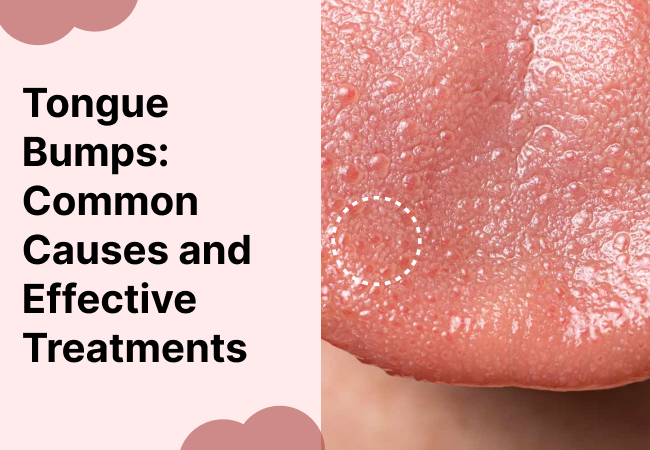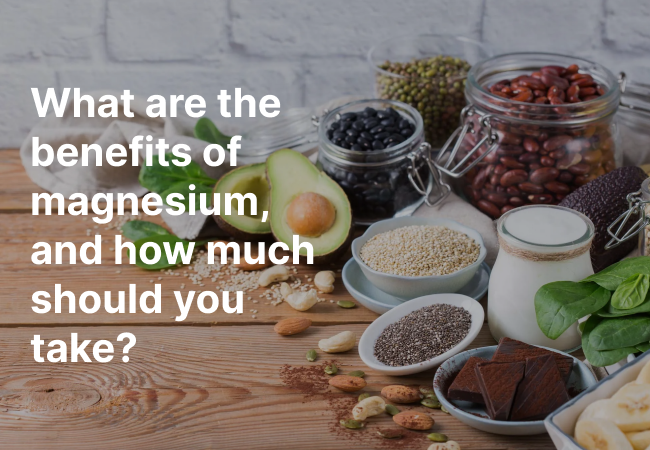Everything You Need to Know About High Creatinine Levels
Creatinine is a natural waste product in the blood that your body produces every day. It comes from the normal wear and tear of muscles and the food you eat.
Your kidneys work like filters — they remove creatinine from your blood and flush it out through urine. This process keeps your kidney function smooth and your body balanced.
Why You Should Monitor Creatinine Levels
Watching your creatinine levels is one of the best ways to check your kidney health. When you have high creatinine levels, it may mean your kidneys aren’t filtering waste properly. That’s when you need to act fast to protect your renal health.
Many people wonder, “When to worry about creatinine levels?” The answer is — when they rise above the normal creatinine range or keep increasing over time. Early kidney disease detection can prevent long-term damage and help you maintain healthy kidneys.
What Is Creatinine?
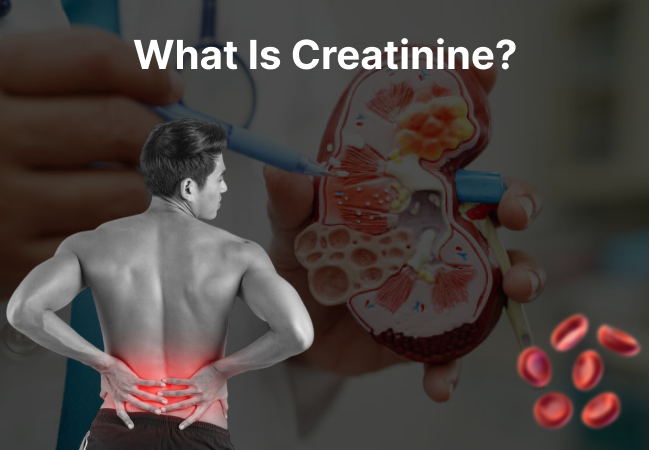
Creatinine forms during muscle metabolism when your body uses creatine phosphate for energy. People with more muscle mass often have higher blood creatinine levels. That’s why men usually show slightly higher levels than women.
How the Body Removes Creatinine
Your body removes creatinine through kidney filtration and creatinine clearance. This process helps with blood purification and overall kidney performance.
If your creatinine removal slows down, it’s a sign your kidney function may be at risk. Regular creatinine tests, good hydration, and healthy habits can help with creatinine management and kidney failure prevention.
Staying aware of your creatinine causes, creatinine symptoms, and creatinine treatment options ensures better kidney care and long-term kidney wellness.
How Do Doctors Test for Creatinine Levels?

Doctors test creatinine levels to check how well your kidneys are working. The process is simple and precise.
They start by taking a blood sample to measure blood creatinine. Then, they use a formula to estimate creatinine clearance, which shows how efficiently your kidneys filter waste.
In some cases, doctors may ask for a 24-hour urine collection. You collect all urine over 24 hours and take it to the lab. This allows doctors to compare creatinine in urine with blood creatinine levels. The results reveal how much creatinine your kidneys are removing and how well they’re functioning.
Types of Creatinine Tests
You can measure creatinine levels through two main tests — a blood creatinine test and a urine creatinine test.
1. Blood Creatinine Test
Also known as a serum creatinine test, this test measures blood purification efficiency. It’s a standard kidney function test.
During the test, blood is drawn from a vein in your arm and sent to a lab for analysis.
Normal creatinine range:
- Males: 60 to 110 micromol/L (0.7 to 1.2 mg/dL)
- Females: 45 to 90 micromol/L (0.5 to 1.0 mg/dL)
If your blood creatinine is higher than the normal creatinine range, it might indicate high creatinine levels or a kidney function issue.
2. Urine Creatinine Test
A urine creatinine test often involves a 24-hour sample, also known as a urine albumin-to-creatinine ratio (UACR) test.
This test checks if albumin leaks into your urine — a potential sign of kidney disease.
- A typical UACR result is below 30 mg/g.
- Anything higher could mean possible kidney damage or reduced kidney efficiency.
Doctors often combine UACR results with glomerular filtration rate (GFR) and creatinine clearance for a complete kidney performance test
Causes of High Creatinine Levels
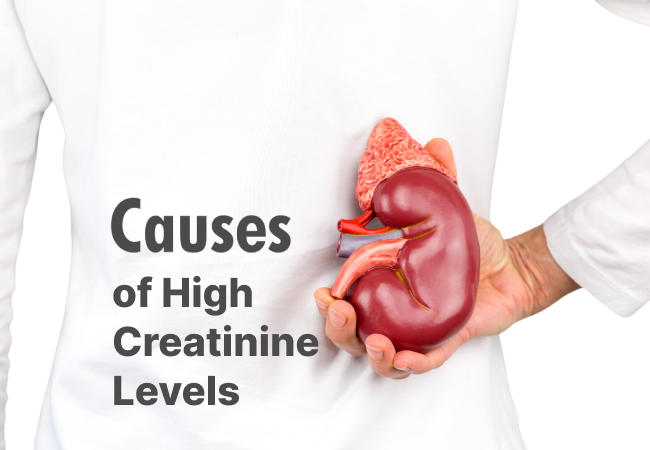
High creatinine levels can result from several factors affecting kidney health or muscle metabolism. Here are the most common causes:
- Chronic Kidney Disease (CKD): A long-term condition where the kidneys lose their filtering power, leading to creatinine buildup.
- Acute Kidney Injury (AKI): A sudden issue caused by dehydration, infection, or medication side effects that spikes creatinine in the blood.
- Dehydration: Low water intake causes dehydration and creatinine elevation, reducing kidney filtration rate and stressing the kidneys.
- High-Protein Diet: Too much protein increases protein metabolism and creatinine production, which strains the kidneys over time.
- Intense Exercise: Hard workouts increase muscle breakdown, producing more creatinine.
Other Factors: Age, diabetes, hypertension, and certain drugs can all raise creatinine levels.
Symptoms of High Creatinine Levels
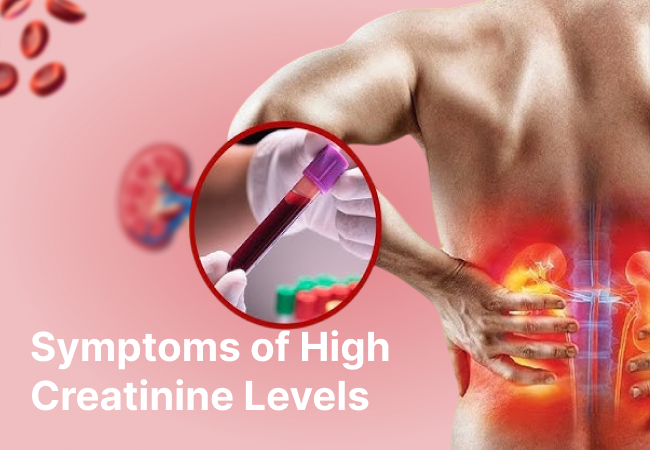
When high creatinine levels rise in your blood, it’s your body’s way of saying your kidney function might be in trouble. The symptoms vary based on the cause. Let’s look at the most common ones.
1. Drug Toxicity
Certain medicines can harm your kidneys. Antibiotics, cardiovascular drugs, and diuretics are a few examples. These can reduce how well your kidneys work, leading to a spike in high creatinine levels.
Common symptoms include:
- Fluid retention
- Fatigue or weakness
- Confusion
- Nausea
- Shortness of breath
- Irregular heartbeat
- Chest pain
If you notice these signs, it may be time to ask your doctor when to worry about creatinine levels.
- Kidney Infection (Pyelonephritis)
An untreated kidney infection (also called pyelonephritis) can damage the kidneys and, in severe cases, lead to kidney failure.
Watch for these symptoms:
- Fever or chills
- Pain in the back, side, or groin
- Cloudy or dark urine
- Foul-smelling urine
- Frequent and painful urination
- Nausea and vomiting
Infections like these can cause creatinine levels to rise quickly.
- Glomerulonephritis
Diseases like lupus and Goodpasture’s syndrome can cause glomerulonephritis. This condition damages the kidney’s filters, leading to protein in urine and foamy urine.
Possible symptoms include:
- High blood pressure
- Flank pain
- Swelling in the face or ankles
- Decreased urine output
- Blood in urine
Over time, this can result in chronic kidney failure.
- Diabetes
Both type 1 diabetes and type 2 diabetes can damage your kidneys. When blood sugar stays high, it strains your kidneys, reducing their ability to filter waste.
Symptoms include:
- Increased thirst and urination
- Fatigue
- Blurry vision
- Slow-healing wounds
- Tingling or numb hands and feet
If left unmanaged, diabetes can lead to diabetic kidney disease and high creatinine levels.
- High Blood Pressure
High blood pressure (hypertension) is a silent threat. It damages the small blood vessels that feed your kidneys, lowering their efficiency.
You may not notice symptoms right away. That’s why routine kidney function tests are vital. It helps you know when to worry about creatinine levels before they get too high.
- Heart Disease
Conditions like atherosclerosis and congestive heart failure affect blood flow to the kidneys. When your heart struggles, your kidneys can’t do their job well.
Look out for:
- Chest pain (angina)
- Shortness of breath
- Nausea
- Swelling in the legs or feet
- Fatigue
Heart and kidney health go hand in hand — protecting one supports the other.
- Urinary Tract Blockage
A urinary tract blockage from kidney stones, tumours, or an enlarged prostate can trap urine in the kidneys. This can cause hydronephrosis (kidney swelling).
Symptoms include:
- Pain in the back or side
- Painful urination
- Blood in urine
- Fever
- Nausea and vomiting
If ignored, blockage can raise creatinine levels and cause kidney damage.
- Kidney Failure
Kidney failure means your kidneys can no longer filter waste properly. It can be acute (sudden) or chronic (develops over time).
Acute kidney failure symptoms:
- Swelling in feet or ankles
- Too much or too little urine
- Shortness of breath
- Nausea and confusion
- Weakness or irregular heartbeat
Chronic kidney failure symptoms:
- Itching
- Muscle cramps
- Difficulty sleeping
- Appetite loss
When these symptoms appear, high creatinine levels may already signal severe kidney damage
When to Contact a Doctor
If you notice new or unexplained symptoms, don’t ignore them. It’s essential to contact a doctor right away.
You should especially seek medical advice if symptoms suggest kidney disease, diabetes, or heart problems. These conditions can lead to high creatinine levels, and early care can make a big difference.
When to worry about creatinine levels?
If you experience fatigue, swelling, changes in urination, or shortness of breath, it’s time to see a doctor for high creatinine. Getting a medical consultation early helps detect problems like chronic kidney disease (CKD) or acute kidney injury (AKI) before they worsen.
Treatments for High Creatinine Levels
Creatinine treatment depends on the underlying cause. For instance, if a kidney infection (pyelonephritis) is responsible, antibiotics can help restore normal kidney function.
If high blood pressure (hypertension) is the cause, taking the proper medication can help lower creatinine levels and protect kidney health.
Doctors may also suggest lifestyle changes for better creatinine management:
- Reduce protein intake to ease kidney workload.
- Increase dietary fibre to support waste removal.
- Stay hydrated and follow a balanced diet.
Making these small, consistent changes can support kidney recovery, improve renal health, and help prevent kidney failure in the long run.
Managing High Creatinine Levels

Managing high creatinine levels is essential for protecting your kidney function and overall health. The good news? With the proper habits and regular checkups, you can take control and keep your kidneys strong.
- Dietary Changes
Your diet plays a massive role in reducing creatinine levels. Limit protein intake, especially from animal sources, since too much protein can strain the kidneys. Instead, focus on a kidney-friendly diet that includes:
- Fresh fruits and vegetables
- Whole grains
- Lean proteins like fish or tofu
Avoid processed foods and high-sodium meals, as they can make your kidneys work harder. Simple food swaps can make a big difference for kidney health.
- Hydration
Hydration for kidney health is key. Drinking enough water helps flush out toxins and creatinine from your body.
Aim to sip water throughout the day instead of drinking large amounts all at once. Staying hydrated supports kidney function and keeps waste moving out efficiently.
- Lifestyle Modifications
Small lifestyle changes for kidney health go a long way.Cut back on intense workouts that cause muscle breakdown, which can raise creatinine levels.
Also, keep your blood pressure in check through regular exercise, a balanced diet, and stress management. Healthy habits can help you prevent kidney disease and maintain normal creatinine levels.
- Supplementation
Sometimes, doctors may suggest kidney supplements like vitamin B1 (thiamine) or vitamin D. These nutrients support kidney health and may improve how well your kidneys filter waste.
- Regular Monitoring
The most critical step? Monitor creatinine levels regularly. Routine checkups help track progress and catch kidney dysfunction early. If you notice symptoms of high creatinine—like fatigue, swelling, or changes in urination—consult your doctor. Knowing when to worry about creatinine levels can prevent serious complications.
Summary
If your kidneys aren’t working correctly, high creatinine levels can build up in your blood. Common causes of high creatinine include poor diet, medications, and underlying health conditions.
With proper creatinine treatment, hydration, and lifestyle adjustments, levels can return to normal.
Always seek medical advice if symptoms persist. Early action can prevent kidney damage and support full kidney damage recovery.
Popular Post
Recent Post
Labcorp Rapid City and Roche Partner to Advance Digital Pathology with AI Integration
Labcorp Rapid City, part of Labcorp (NYSE: LH), a global leader in laboratory services, has announced a new collaboration with Roche. Together, they’re introducing FDA-cleared VENTANA DP 600 and VENTANA DP 200 slide scanners to bring a digital revolution in pathology. This powerful partnership focuses on using digital pathology and AI integration to make […]
Why Do My Hands Shake? Causes, Normal Reasons, and Effective Remedies
Ever noticed your hands trembling while holding a cup or writing something? That’s known as shaking hands or hand tremors. These can happen to anyone and may result from various factors — including medical conditions or everyday habits. Understanding what type of tremor you have is key to getting an accurate tremor diagnosis and […]
Everything You Need to Know About High Creatinine Levels
Creatinine is a natural waste product in the blood that your body produces every day. It comes from the normal wear and tear of muscles and the food you eat. Your kidneys work like filters — they remove creatinine from your blood and flush it out through urine. This process keeps your kidney function smooth […]
How much protein does your body really need each day?
Protein: The Building Block of Life Proteins are the essential building blocks that make up your body. They help you grow, repair, and stay strong. Every part of your body—muscles, tendons, organs, and skin—relies on protein. But protein does more than build your body. It also helps create enzymes, hormones, and neurotransmitters—tiny molecules that keep […]
Tongue Bumps: Common Causes and Effective Treatments
Ever notice small bumps on your tongue and wonder what caused them? Don’t worry — you’re not alone. Tongue bumps are common and often harmless. But sometimes, they can signal something more serious, like an infection, allergy, or injury that needs attention. Let’s break it down in simple terms. What Are Tongue Bumps? Your tongue […]
What are the benefits of magnesium, and how much should you take?
In the world of nutrients, vitamins, and supplements, magnesium is finally getting the attention it deserves. For years, it’s been the unsung hero of good health — overlooked, underappreciated, and often forgotten. But that’s changing. Today, more people are learning just how vital magnesium for health really is. From better sleep to stronger bones, the […]
